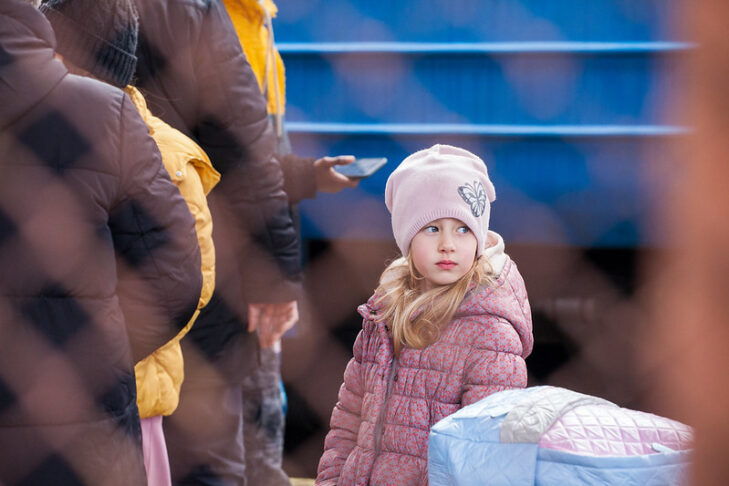There are so many heartwarming stories of humanitarian assistance in connection with helping the refugee families in Ukraine. We have all heard and seen snippets of them on the 24-hour news cycle. While the fighting in Ukraine continues, some of us are naturally tiring of the depressing news from that region as we move onto outrage over the likely reversal of Roe v. Wade and the ongoing congressional investigation of the Jan. 6 insurrection, just to mention a few news items.
But there is indeed a severe ongoing refugee crisis in Europe involving millions of mostly women and children with daily heartaches too unbearable to contemplate. As in the case of “The Diary of Anne Frank,” where the focus is on the daily story of one individual, the power of a tragedy is often more relatable when you focus on one individual’s account.
This past week, I was privileged to participate in a chat group with others who followed the daily schedule of a young Israeli volunteer named Mirit Sulema, who, along with a delegation of dozens of other young Israelis, recently concluded eight days of leading activities for children at a makeshift day camp created in Poland near the Ukrainian border. The organization sponsoring the camp is Dror Israel, a progressive social justice movement in Israel that trains young adults as educators who work with vulnerable populations in Israel to empower children at risk to achieve their full potential. Mirit herself lives in Dror’s Akko Educators Kibbutz.
When the need arose in Eastern Europe to assist refugees of all backgrounds, Dror did not hesitate to do what they do best: help needy children in crisis. While there are many refugee centers across Europe providing humanitarian assistance, Dror identified the unmet need of providing daytime programming for children and teens who had nothing to do all day other than hang out on their screens and fall victim to boredom and depression.
So they set up a temporary day camp in Warsaw, Poland, to keep kids as occupied and happy as possible while these children cycled through their temporary setting with their mothers. I say mothers because as we know, most men between the ages of 18 and 60 are not allowed to leave Ukraine. The camp lasted seven weeks and was run by 85 of Dror Israel’s educators.
Some might think, well, what’s the point of such an arrangement? What could you possibly do to assist children who may only be in your program for a few days? How could you possibly have a positive impact? What’s remarkable were several heartwarming stories that showed what indeed was possible to achieve under these less-than-ideal circumstances. In one instance, Mirit showed a little girl named Angelina how to juggle with a set of acrobatic sticks that she had herself used to entertain the kids. Angelina was very taken with this activity and worked on it for hours. When Mirit learned that Angelina would be leaving for parts unknown the following day, she faced an ethical dilemma: Should she give Angelina the sticks to keep, or hold onto them so others could also try them out? In the end, Mirit surreptitiously buried the sticks in Angelina’s bag. This small act of kindness is certain to empower Angelina as she and her family continue to pursue their flight to somewhere else.
Another positive aspect of the mission was the impact of the camp program on the moms who suddenly received the gift of a bit of time away from their children and their child care responsibilities. This precious gift allowed them “luxuries” such as taking a shower and talking on the phone without having to attend to their children for a while, a much-needed respite in a storm of decisions and uncertainty.
Mirit’s honesty in the way she described her own experience was also telling: How well was she coping with daily challenges; was she having any impact at all; how can you form meaningful relationships with such a transient group; and how do you deal with your own exhaustion and emotional reaction to such a terrible tragedy affecting so many families? Her personal revelations really humanized the experience of what volunteers go through in these difficult settings.
Of all the activities Mirit described that she and her team created, the one that made the most lasting impression on me was their decision to conduct a training session for young teens on leadership skills. In general, the teen population was the hardest to engage throughout their stay, which makes perfect sense. Teens are a challenge under the best of circumstances, so imagine what it would take to interest teens more than their social media screens. Although Mirit did not explicitly say this, my impression was that the Israeli volunteers essentially created a mini Israeli scouts experience, teaching teens the skills they need to be counselors to younger children. By the end of the session, the teenagers devised their own activities for working with the younger children, and in the process felt good about themselves as role models.
To me, this exercise was quintessentially Israeli. Others might say, well, what’s the point in doing a one-day training session for teenagers whose future is so uncertain and who would have no way to continue that training anytime soon? But that’s not the Israeli way. I’m continually impressed with the “can do” attitude so characteristic of Israel that always figures that it’s better to try something that may or may not succeed than to do nothing.
At the end of her stay, Mirit, of course, had very mixed emotions about returning to Israel but did not want to create any “drama” about her leave-taking given the sea of trauma surrounding her.
It was decided that Mirit’s day camp would be the last so that the team could focus on the absorption of immigrants in Israel this summer. Over the seven-week period, there were three training and coaching courses given so that Polish women could continue to manage and guide the day camp activities. Also, young Ukrainian women who are now settled in Poland will serve as instructors. A total of 50 people were trained.
Sadly, our world is filled with nightmarish scenarios like the unprovoked Russian invasion of Ukraine, but the many pockets of light and goodness continue to inspire in spite of it all and give us hope for humanity.
Israel has never shied away from global crises, and serving Ukrainian women and children by identifying an unmet need and providing a sustainable infrastructure to continue the day camp model is a shining example of what a committed group of social justice warriors can succeed in accomplishing despite the obvious challenges. It was a privilege to have a front-row seat to hear about and see photos and videos documenting this effort by Dror Israel.
For more information about this operation, visit drorisrael.org/campdrorukraine.
This post has been contributed by a third party. The opinions, facts and any media content are presented solely by the author, and JewishBoston assumes no responsibility for them. Want to add your voice to the conversation? Publish your own post here. MORE



